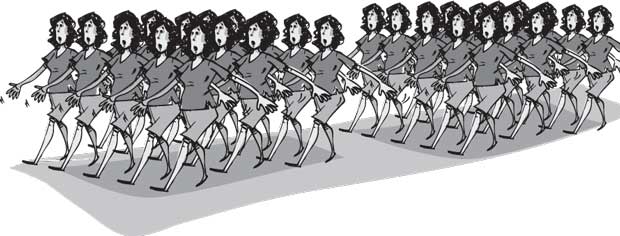Reply To:
Name - Reply Comment

As we mark International Women’s Day tomorrow, several world leaders including Pope Francis have spoken out on the importance of including women’s perspectives in decision-making.
“Women have much to tell us in today’s society.” Sometimes we’re too macho and don’t leave enough room for women. They see things with different eyes. Women are able to ask questions that men can’t understand,” the Pope said during his recent visit to the Philippines after he visited Sri Lanka. Before he spoke at a university in Manila, the Pope said a young girl who had been a street child till she got help from an organization that helps abandoned children, asked why God allowed bad things — like falling into prostitution and drugs — to happen to her and children like her. “She is the only one who has asked a question for which there is no answer,” the Pope said. “She was not even able to express it in words but rather in tears.”
According to Sri Lanka’s Department of Census and Statistics, the estimated population in the 2012-2014 survey was about 10.642 million females and 10.033 males. That means there are more than half a million females than males in Sri Lanka and this is so even in the number of voters. But figures worked out by experts from the United Nations Development Programme show that in Parliament -- the supreme legislature of the sovereign people -- the number of female MPs stands at 5.6 per cent or less than 15 of the 225-member House. This is among the lowest in South Asia. In Provincial Councils and Local Authorities the number of females is less than three per cent.
Women from Sri Lanka’s formerly conflict-affected districts face additional challenges, having to bear additional economic and social burdens especially if they have lost male family members and living in areas where decision-making structures are themselves just being resuscitated following the end of the war, the UN report said.
Sri Lanka is the only country without special measures to facilitate women’s representation in local authorities. In Bangladesh, at least 25% of seats are reserved for women in Union Councils. In India not less than 33% of seats are reserved for women and other marginalised groups in all local bodies. In Nepal 20 % of the seats in Village and Municipal Councils are reserved for women. In Pakistan 33% of seats are reserved for women at the Union, municipality and district level. Obviously, all these countries have recognized the necessity for women’s representation in local authorities as both a factor for development and a fundamental rights issue.
We hope that in the next parliamentary election to be held sometime this year, the two main parties, the UNP and the SLFP, and others will ensure that at least 25 % of the nominations are reserved for highly qualified women of high integrity and accountability instead of some sex symbols who were put on the stage for the 2010 election.
Foreign Employment Promotion and Welfare Minister Thalatha Atukorale and the Minister of State for Child Development, Rosy Senanayake -- a firebrand for women’s rights -- have repeatedly promised they would work to ensure greater representation for women in the law- making parliament, local councils and other important positions. We hope and believe they will keep their promises. Sri Lanka produced the world’s first woman Prime Minster Sirimavo Bandaranaike while her daughter Chandrika Bandaranaike Kumaratunga was the Executive President from 1994 to 2005. Therefore the level to which women’s representation in the decision making political arena has dropped is a degradation of females and a disgrace to the country. Male Chauvinism and domination are unjust if not evil. They must end now.